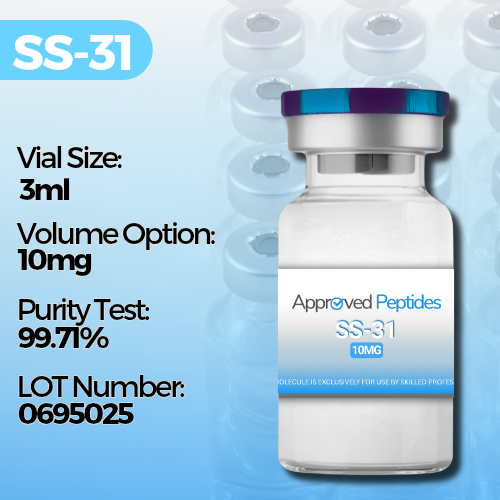Approved Peptides are intended for licensed medical professionals and experienced researchers. Reconstitution required. Dosing and use instructions are not provided.
SS-31
SS-31
Couldn't load pickup availability
SS-31– Research Peptide Review
A Breakthrough in Mitochondrial Medicine
SS-31 is a small synthetic tetrapeptide (D-Arg-Dmt-Lys-Phe-NH₂) developed in the early 2000s to target mitochondrial dysfunction — one of the fundamental contributors to aging and chronic disease. Unlike many peptides that exert systemic signaling effects, SS-31 is engineered to selectively penetrate the inner mitochondrial membrane and bind cardiolipin, a phospholipid essential for maintaining mitochondrial structure and function.
This specificity has made SS-31 one of the most exciting investigational compounds in the field of regenerative medicine, bioenergetics, and age-related disease research.
Research Applications and Benefits
Extensive preclinical and early clinical studies suggest SS-31 may hold broad utility in addressing mitochondrial decline and its downstream effects:
-
Mitochondrial Protection
SS-31 binds directly to cardiolipin, stabilizing the inner mitochondrial membrane, improving electron transport chain efficiency, and reducing leakage of reactive oxygen species (ROS). -
Improved Cellular Energy Production
By enhancing ATP output, SS-31 may restore energy homeostasis in cells compromised by age, disease, or injury. -
Antioxidant and Anti-Apoptotic Effects
Unlike conventional antioxidants, SS-31 works inside mitochondria to reduce oxidative stress at the source, helping prevent cell death and tissue degeneration. -
Cardiac and Skeletal Muscle Research
Experimental studies have shown benefits in models of heart failure, ischemia-reperfusion injury, and skeletal muscle weakness, suggesting SS-31 may help sustain tissue resilience under metabolic stress. -
Neuroprotective Potential
Research indicates SS-31 may mitigate mitochondrial dysfunction in neurons, making it a compound of interest in neurodegenerative disease models such as Alzheimer’s and Parkinson’s.
As with all peptides provided for research purposes only, SS-31 is not approved for human use or medical treatment.
- Stability – Lyophilized SS-31 is stable when stored in a cool, dry environment until reconstitution for laboratory use.
- Regulatory Status – While SS-31 has been tested in clinical trials for mitochondrial disease and heart failure, it remains investigational and unapproved by the FDA or any governing authority.
- Ethical Research Protocols – SS-31 should be studied only under controlled laboratory settings with adherence to all regulatory frameworks.
SS-31 (Elamipretide) stands at the frontier of mitochondrial-targeted therapy research, uniquely designed to repair and stabilize the energy-producing machinery of the cell. Its ability to directly interact with cardiolipin distinguishes it from other compounds, making it a promising tool for exploring the mechanisms of aging, cardiovascular decline, neurodegeneration, and systemic energy deficits.
While still under investigation, SS-31 offers researchers a rare opportunity to better understand how mitochondrial health underpins cellular vitality and longevity.
Share


